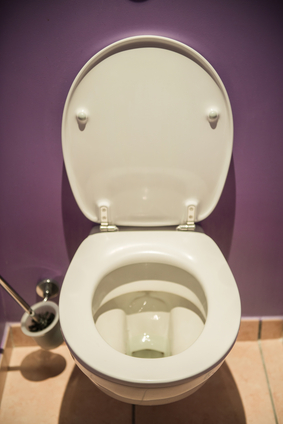by Dr. Craig A. Maxwell
Bowel movements. Stool. Poop. While these words certainly aren’t on the list of subjects that should come up during polite dinner conversation, I believe we’d be healthier as a society if we acknowledged what goes on in the bathroom.
Even if we can’t talk about it amongst each other, it should be something we can examine on our own.
If you’re the type to do what you need to do in the bathroom, flush, wash up, and walk away, you could be missing some vital clues about the state of your health. It may sound a bit embarrassing, but the next time you visit the toilet to “do the doo”, don’t flush until you look down.
What the Color and Consistency of Your Poop Reveals About Your Health
Ideally, your poop should be a light to medium brown. If the color is radically different from this, it could be the sign of an underlying health problem.
Let’s take a look at this chart to understand unhealthy poop colors and what they mean:
-
White or Clay-Colored Stools * Could indicate a lack of bile in the stool, which may be caused by insufficient bile output or obstruction due to conditions such as gallstones, parasitic infection, hepatitis, chronic pancreatitis, cholecystitis, and giardia (protozoan infection). Medications such as antacids, Pepto-Bismol or Kaopectate may also cause this color stool. Green Stool * Caused by overactive (increased) bowel transit time before the bile has changed from green to brown. This increased transit time can be caused by food poisoning, C. Diff infection, Crohn’s disease, ulcerative colitis, IBS, protozoan infection, and cancer. Side effects of medication (ciprofloxacin, Lexapro, NyQuil, and Zantac) as well as alcoholism can also cause this color stool. Yellow Stool * Caused by an inability to digest fat, inadequate digestive enzyme production from the pancreas, celiac disease, cystic fibrosis, or protozoan infection. Black, Tarry Stools* Caused by bleeding somewhere in the digestive tract (esophagus, stomach, duodenum, small intestine, colon), which may be a factor of Crohn’s disease, ulcerative colitis, gastritis, intestinal infection or diverticulosis. May also indicate the presence of ulcer or intestinal cancer. Black licorice, blueberries, beets, tomatoes, lead, iron pills, and medications like Pepto-Bismol can also cause black, tarry stools. Red Stool* Caused by intestinal bleeding, (though the stool is not usually entirely red). The causes are similar to the causes of black, tarry stool. May also be caused by food coloring and certain dietary supplements.
*If you have any of these, please seek medical attention to rule out serious disease.
Consistency
A healthy stool should be smooth and soft, pass easily, and be formed into one long shape, (usually an S-shape, which conforms to the shape of the intestinal tract). The size is usually about one to two inches in diameter but can be up to 18 inches long. It should have a uniform texture and sink slowly after being expelled.
If this describes your poop, your digestion is pretty darn healthy!
Let’s take a look at this chart to understand unhealthy poop consistency and what they mean:
-
Hard to Pass, Painful, Requires Straining* Caused by constipation, dehydration, and/or a functional bowel disorder or cancer. Hard Lumps or Pieces* Caused by slow-transit constipation, too-little fiber in the diet, dehydration, and/or a functional bowel disorder. Mushy or Watery * Caused by stool moving too rapidly through the gut. This can be caused by viral or parasitic infection, malabsorption disorders, and motility disorders. Pencil-Thin* Caused by an increase in fiber intake, sorbitol or Olestra consumption. Could indicate a bowel obstruction, tumor, or colon cancer. Greasy or Floating* Caused by an inability to digest fat, which often happens due to a malabsorption disorder. This is often accompanied by a strong odor, which may indicate the presence of celiac or Crohn’s disease. This type of stool consistency may also indicate pancreatic cancer, which prevents proper pancreatic enzyme release.
*If you have any of these, please seek medical attention to rule out serious disease.
Poop Shouldn’t Smell Like Roses, But it Shouldn’t be too Unpleasant
The smell of your poop is just as important an indicator of digestive health as its color and consistency. It’s normal for poop to have an odor, but if it is particularly strong and unpleasant it could indicate an underlying digestive health problem that needs to be addressed.
The most common causes of foul-smelling stools include celiac disease, Crohn’s disease, chronic pancreatitis, and cystic fibrosis. If your poop has a strong odor, you may experience foul-smelling flatulence as well. Most people pass wind up to 14 times a day without much notice unless there is an unpleasant odor. This expulsion of gas is just a sign your digestive system is keeping things moving.
Just How Often Should You be Visiting the Bathroom Anyway?
Most healthy people have anywhere from three bowel movements per day to three per week. However, it is ideal to move your bowels a minimum of once or twice a day to prevent toxic build-up in your body.
When you visit the bathroom, you shouldn’t have to push or strain to get things moving. If constipation is a problem for you, I recommend avoiding prescription and over-the-counter laxatives. Use them only as a last resort. It is easy to become dependent on them.
There are more holistic ways to treat constipation, which I mention below.
How to Improve Your Overall Bowel Health and Function
If the color, consistency and smell of your poop isn’t ideal, there is plenty you can do at home to improve your overall bowel health and function. Just be sure to first talk with your healthcare provider about any obvious abnormalities to rule out serious disease.
- Make Dietary Changes
For my patients with functional bowel disorders, I recommend removing all sources of gluten from the diet. Even if you have not been diagnosed with celiac disease, you may have an underlying gluten sensitivity that will have a negative effect on your digestion.
I strongly recommend removing junk food from your diet as well. Additives and preservatives like high fructose corn syrup, MSG, food dyes, and the like offer no health benefits and can interrupt the normal function of your digestive system.
The best diet for optimum bowel function includes whole foods such as organic produce, whole, non-gluten grains, beans, legumes, fermented foods like kimchi and kefir, grass-fed beef, poultry, wild-caught fish, and moderate amounts of healthy fats like coconut oil, olive oil and grass-fed butter.
- Take High-Quality Supplements
For my patients with chronic gastrointestinal problems, I recommend two high-quality supplements to regulate digestion naturally.
They are:
- Diamond Nutritional’s Probiotic Formula
A high-quality probiotic supplement is essential to good gastrointestinal health. Without an adequate amount of this beneficial bacteria, it is difficult for your body to break down and absorb nutrients from food.
Diamond Nutritional’s Probiotic Formula contains a count of 22 million colony forming units to help maintain the health of the colon. It is a complete formula that contains lactobacillus acidophilus, lactobacillus paracasei, bifidobacterium lactis, bifidobacterium bifidum, lactobacillus plantarum, lactobacillus rhamnosus and saccharomyces boulardii.
- Diamond Nutritional’s Bowel Support Formula
In addition to a high-quality probiotic supplement, I also recommend adding Diamond Nutritional’s Bowel Support Formula. It contains psyllium husk fiber, psyllium seed powder, rice bran, apple pectin, fig, and prune to help regulate your digestion and keep things moving in a healthier, more regular way.
- Stay Hydrated
Drinking 8-10 glasses of pure, filtered water each day can help improve your digestive motility and keep your bowel movements regular.
- Get Plenty of Exercise
Exercise improves the blood circulation throughout your body, including your digestive system. Exercising at least 30 minutes per day three times per week is enough to get you back on the road to digestive wellness. (Always talk with a trusted healthcare provider before embarking on a new exercise routine).
It may go against your sensibilities to look before you flush, but don’t be shy. When you understand more about what the color and consistency of your poop means, you are able to take better care of your health.
You’ve Come This Far. Can You Stomach a Bit More?
Read Next:










Excellent article. I have had diarrhea for 2 months and was on
Cipro for 10 days 6 pills 250 mg.Did not help. I take Lyrica and the dose was increased 100 mg.I take 150mg a.m.and 150 p.m. but I just cut back to 100 mg twice a day as Iwas told that large dose can give me the problem.I am a diabetic2 taking ongliza and gligazide.
What might help me.I take and immodium to go out. I stay in most of the time. My stools are a yellowish color and I go 5-6 times a day.They are mushy with mucous. I was negative for C difficile but awaiting a parasitic report which is taking three months nearly.
I read allyour articles and just think you are great. Thank you
Sincerely, Aurella
Hello Aurella,
Thank you for your question, as well as for the kind words.
I recommend reading this article and ordering the stool test mentioned
in it:
http://askdrmaxwell.com/2012/10/signs-and-symptoms-of-chronic-candida-yeast-syndrome/
It has helped many find the cause of their GI symptoms.
Other stool testing is not as comprehensive. In addition to parasites,
this will check you for chronic yeast, which you may have.
This is usually easily treated.
From what you have told me, I have more ideas to help you. I would like
to speak with you over the phone to give you a more comprehensive treatment plan.
Please call my office at 513-741-4404 to set up a time for a consultation. I look forward to helping
you achieve your best health.
Dr. Craig A. Maxwell
I had c. Diff., had antibiotic van. Ten days. When antibiotic over, had two stool cultures and tested negative. After almost two weeks have still bland diet, probiotic, yogurt. Having bouts of five to six loose stools and when I eat meals have to have a stool immediately. Going to doctor another time.
Hello Ms. Scalzo,
As you know, Vancomycin, while often getting rid of C. diff, will also kill off good bacteria. This will allow candida to overgrow in the colon.
For my patients with these symptoms, I have used Diamond Nutritional’s Ultra Probiotic Formula for years with good success. Most probiotic formulas do not
have enough live strains (at least 6) or number (at least 100 billion daily) to help.
Dr. M